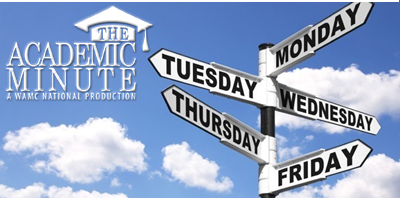The Academic Minute for 2016.11.7-11.11

Academic Minute from 11.7 – 11.11
Monday, November 7th
Sherry Linkon – Georgetown University
Working Class Voters
I do research in two areas: working-class studies and scholarship of teaching and learning. In working-class studies, much of my work explores the cultural meaning and social costs of deindustrialization. I’m currently working on a study of contemporary American literature that reflects the continuing influence of deindustrialization on working-class people and their communities.
I’ve also done some research and writing on teaching about social class and supporting working-class students in higher education.
My work on teaching and learning focuses on students’ learning in the humanities. I’ve written about students’ struggles with interdisciplinary analysis, and I published a book about teaching literature in the context of the English major.
Tuesday, November 8th
Benjamin Ho – Vassar College
Political Apologies
Ben Ho is an associate professor of behavioral economics at Vassar College who applies economic tools like game theory and experimental design to understand social systems such as apologies, identity, fairness and attitudes about climate change. Before Vassar, he taught MBA students at Cornell University’s Johnson School of Management. Professor Ho was also lead energy economist at the White House Council of Economic Advisers, and has worked and consulted for Morgan Stanley and several tech startups. Professor Ho also teaches at Columbia University where he is a faculty affiliate for the Center for Global Energy Policy. His work has been featured in the New York Times and the Wall Street Journal. Ho holds seven degrees from Stanford and MIT in economics, education, political science, math, computer science and electrical engineering.
Wednesday, November 9th
Ann Gordon – Chapman University
Natural Disaster Preparedness
Dr. Ann Gordon is associate dean of Wilkinson College of Arts, Humanities and Social Sciences, and an associate professor of political science. She is the director of the Ludie and David C. Henley Social Sciences Research Laboratory. Dr. Gordon has published three books and numerous articles. She is Co-PI of the ongoing Chapman Survey of American Fears (CSAF), leading the team studying disasters and preparedness. The CSAF has been featured in over 800 print and broadcast media including the New York Times, The Huffington Post, CBS This Morning, Yahoo News, Good Housekeeping, the Washington Post, USA Today, and TIME. Dr. Gordon works with emergency managers in Southern California on communicating preparedness to the public.
Thursday, November 10th
Joan Cook – Yale University
Why People Don’t Talk About Traumatic Events
Dr. Cook’s clinical and research interests falls within three domains: traumatic stress, geriatric mental health, and the dissemination and implementation of effective mental health services in the community. She has served as the principal investigator of four NIMH examining the implementation of evidence-based practices by front-line providers. Her ultimate goal in this regard is to offer empirically-supported recommendations on how to overcome the barriers to achieving effective treatments in the community and to apply such protocols in large scale services effectiveness research. One focus is on understanding means of influencing clinician attitudes and preferences with an equal concentration on re-designing interventions and strategies to implement them to fit the needs and preferences of clinicians.
Friday, November 11th
Robert Edgell – SUNY Polytechnic Institute
Media and Governance
Dr. Robert Edgell is an Assistant Professor of Technology Management at SUNY Polytechnic Institute and a Visiting Professor at the Swiss Business School in Zurich. Previously, he was a professor at American University’s Kogod School of Business and has taught at San Francisco State University’s College of Business.
His current scholarly research focuses on a range of interdisciplinary topics including media as a lever for corporate governance, responsible innovation and harm (in collaboration with colleagues from Stanford University Law School), top management team creativity processes, and entrepreneurial social impact.
Dr. Edgell received his Ph.D. in international multicultural management (magna cum laude) from the University of St. Gallen (AACSB accredited). He holds an MBA fromColumbia University Business School in the City of New York and a Bachelor of Architecture (5 year degree, cum laude) from Kent State University. Through Columbia’s Chazen Institute of International Business, he studied at the Rotterdam School of Management in The Netherlands. He is a registered architect and has studied at Harvard’s Graduate School of Design.


